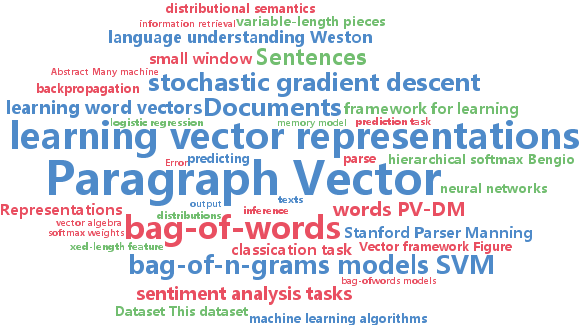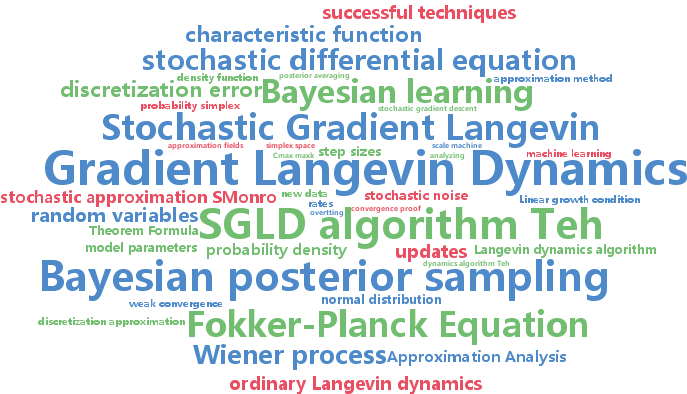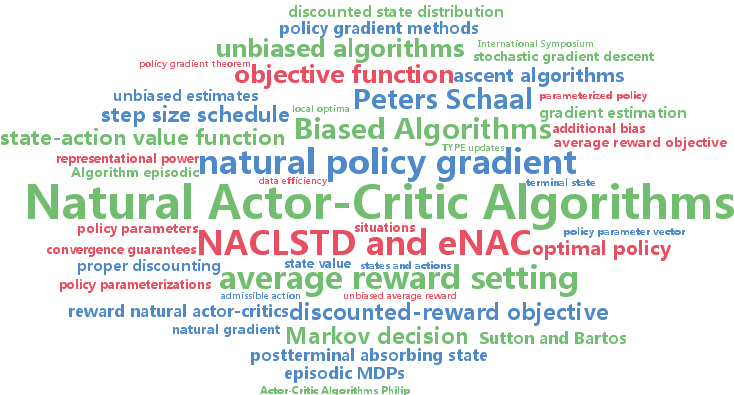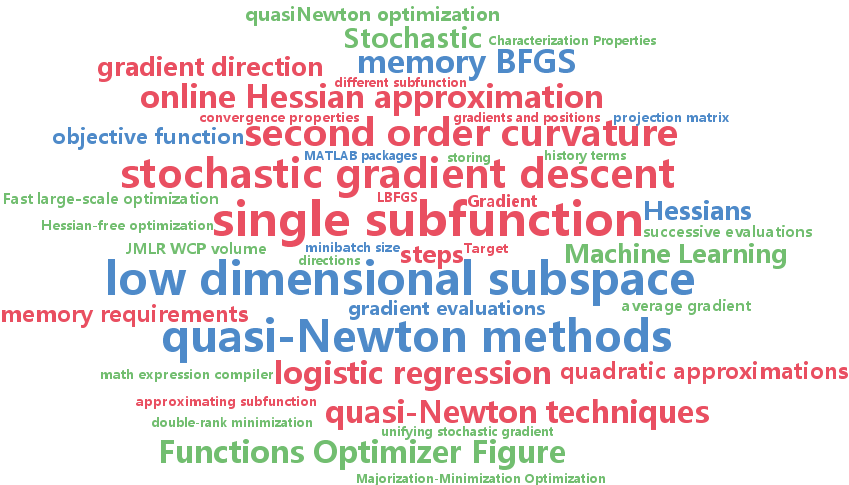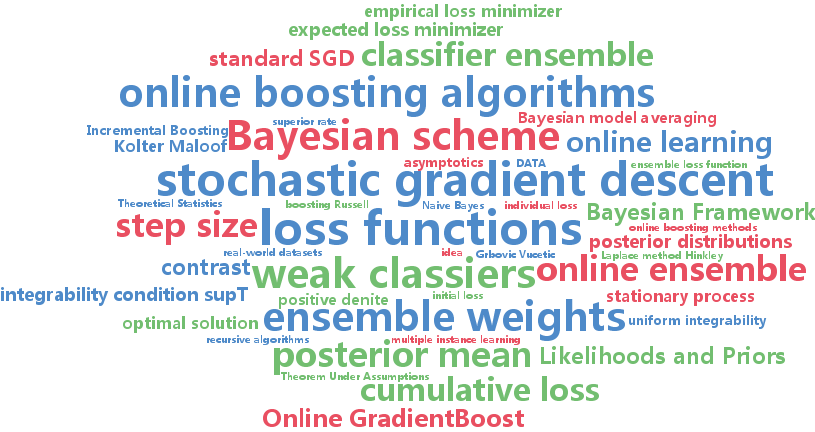stochastic gradient descent
-
Panagiotis Toulis and Edoardo Airoldi and Jason Rennie
Statistical analysis of stochastic gradient methods for generalized linear models (pdf)
We study the statistical properties of stochastic gradient descent (SGD) using explicit and implicit updates for fitting generalized linear models (GLMs). Initially, we develop a computationally efficient algorithm to implement implicit SGD learning of GLMs. Next, we obtain exact formulas for the bias and variance of both updates which leads to two important observations on their comparative statistical properties. First, in small samples, the estimates from the implicit procedure are more biased than the estimates from the explicit one, but their empirical variance is smaller and they are more robust to learning rate misspecification. Second, the two procedures are statistically identical in the limit: they are both unbiased, converge at the same rate and have the same asymptotic variance. Our set of experiments confirm our theory and more broadly suggest that the implicit procedure can be a competitive choice for fitting large-scale models, especially when robustness is a concern.
-
Quoc Le and Tomas Mikolov
Distributed Representations of Sentences and Documents (pdf)
Many machine learning algorithms require the input to be represented as a fixed length feature vector. When it comes to texts, one of the most common representations is bag-of-words. Despite their popularity, bag-of-words models have two major weaknesses: they lose the ordering of the words and they also ignore semantics of the words. For example, "powerful," "strong" and "Paris" are equally distant. In this paper, we propose an unsupervised algorithm that learns vector representations of sentences and text documents. This algorithm represents each document by a dense vector which is trained to predict words in the document. Its construction gives our algorithm the potential to overcome the weaknesses of bag-of-words models. Empirical results show that our technique outperforms bag-of-words models as well as other techniques for text representations. Finally, we achieve new state-of-the-art results on several text classification and sentiment analysis tasks.
-
Issei Sato and Hiroshi Nakagawa
Approximation Analysis of Stochastic Gradient Langevin Dynamics by using Fokker-Planck Equation and Ito Process (pdf)
The stochastic gradient Langevin dynamics (SGLD) algorithm is appealing for large scale Bayesian learning. The SGLD algorithm seamlessly transit stochastic optimization and Bayesian posterior sampling. However, solid theories, such as convergence proof, have not been developed. We theoretically analyze the SGLD algorithm with constant stepsize in two ways. First, we show by using the Fokker-Planck equation that the probability distribution of random variables generated by the SGLD algorithm converges to the Bayesian posterior. Second, we analyze the convergence of the SGLD algorithm by using the Ito process, which reveals that the SGLD algorithm does not strongly but weakly converges. This result indicates that the SGLD algorithm can be an approximation method for posterior averaging.
-
Philip Thomas
Bias in Natural Actor-Critic Algorithms (pdf)
We show that several popular discounted reward natural actor-critics, including the popular NAC-LSTD and eNAC algorithms, do not generate unbiased estimates of the natural policy gradient as claimed. We derive the first unbiased discounted reward natural actor-critics using batch and iterative approaches to gradient estimation. We argue that the bias makes the existing algorithms more appropriate for the average reward setting. We also show that, when Sarsa(lambda) is guaranteed to converge to an optimal policy, the objective function used by natural actor-critics is concave, so policy gradient methods are guaranteed to converge to globally optimal policies as well.
-
Feiping Nie and Yizhen Huang and Heng Huang
Linear Time Solver for Primal SVM (pdf)
Support Vector Machines (SVM) is among the most popular classification techniques in machine learning, hence designing fast primal SVM algorithms for large-scale datasets is a hot topic in recent years. This paper presents a new L2-norm regularized primal SVM solver using Augmented Lagrange Multipliers, with linear-time computational cost for Lp-norm loss functions. The most computationally intensive steps (that determine the algorithmic complexity) of the proposed algorithm is purely and simply matrix-by-vector multiplication, which can be easily parallelized on a multi-core server for parallel computing. We implement and integrate our algorithm into the interfaces and framework of the well-known LibLinear software toolbox. Experiments show that our algorithm is with stable performance and on average faster than the state-of-the-art solvers such as SVMperf , Pegasos and the LibLinear that integrates the TRON, PCD and DCD algorithms.
-
Jascha Sohl-Dickstein and Ben Poole and Surya Ganguli
Fast large-scale optimization by unifying stochastic gradient and quasi-Newton methods (pdf)
We present an algorithm for minimizing a sum of functions that combines the computational efficiency of stochastic gradient descent (SGD) with the second order curvature information leveraged by quasi-Newton methods. We unify these disparate approaches by maintaining an independent Hessian approximation for each contributing function in the sum. We maintain computational tractability and limit memory requirements even for high dimensional optimization problems by storing and manipulating these quadratic approximations in a shared, time evolving, low dimensional subspace. This algorithm contrasts with earlier stochastic second order techniques that treat the Hessian of each contributing function as a noisy approximation to the full Hessian, rather than as a target for direct estimation. Each update step requires only a single contributing function or minibatch evaluation (as in SGD), and each step is scaled using an approximate inverse Hessian and little to no adjustment of hyperparameters is required (as is typical for quasi-Newton methods). We experimentally demonstrate improved convergence on seven diverse optimization problems. The algorithm is released as open source Python and MATLAB packages.
-
Qinxun Bai and Henry Lam and Stan Sclaroff
A Bayesian Framework for Online Classifier Ensemble (pdf)
We propose a Bayesian framework for recursively estimating the classifier weights in online learning of a classifier ensemble. In contrast with past methods, such as stochastic gradient descent or online boosting, our framework estimates the weights in terms of evolving posterior distributions. For a specified class of loss functions, we show that it is possible to formulate a suitably defined likelihood function and hence use the posterior distribution as an approximation to the global empirical loss minimizer. If the stream of training data is sampled from a stationary process, we can also show that our framework admits a superior rate of convergence to the expected loss minimizer than is possible with standard stochastic gradient descent. In experiments with real-world datasets, our formulation often performs better than online boosting algorithms.

